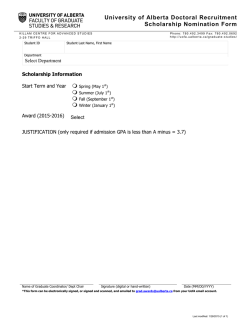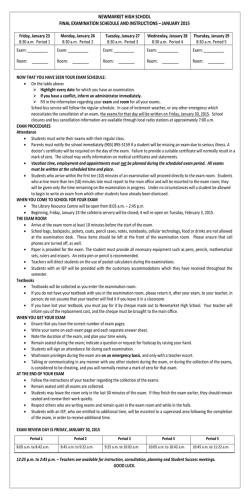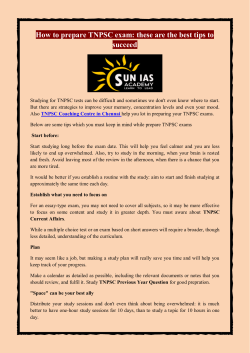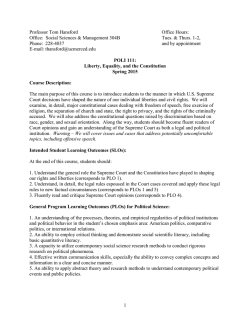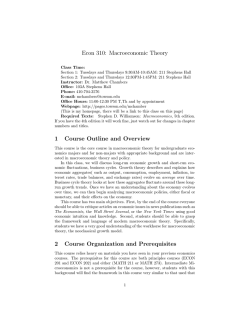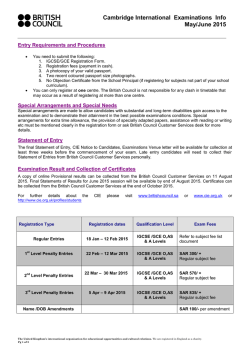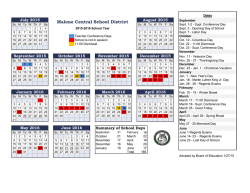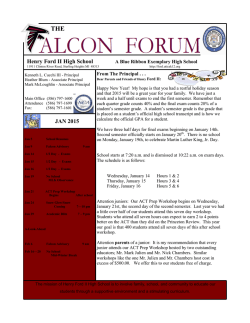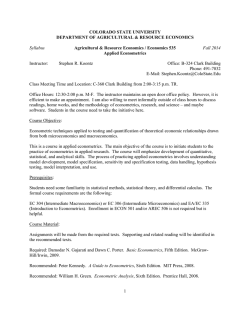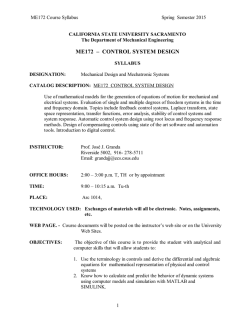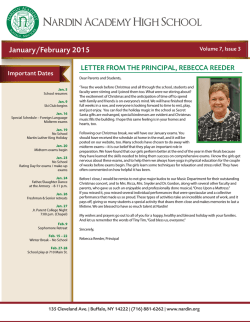
SOC 224 - Sociology - University of Alberta
UNIVERSITY OF ALBERTA DEPARTMENT OF SOCIOLOGY SOCIOLOGY 224 B2 (Winter 2015) SOCIOLOGY OF DEVIANCE AND CONFORMITY Tuesday and Thursday 2:00 - 3:20pm TL 12 Instructor: Office: Office Hours: Telephone: Email: Website: Dr. Stephen A. Kent 6-16 Tory Tuesday and Thursday, 3:30 to 5:00pm or by appointment 492-2204 (my office and messages) [email protected] http://www.artsrn.ualberta.ca/skent/ PREREQUISITES: None COURSE OVERVIEW: The lectures and readings are designed to provide an overview of the prominent theoretical issues in the sociology of deviance and conformity, supplemented by historical and contemporary examples from a variety of cultural contexts. I emphasize Canadian issues whenever possible. REQUIRED TEXT: Bereska, Tami M. 2014. Deviance, Conformity, and Social Control in Canada. 4th Edition. Toronto: Pearson. EVALUATION: Your grade for this course will be based on: Mid-term exam I Mid-term Exam II Final Exam 33.3% 33.3% 33.3% January 29, 2015 March 5, 2015 Tuesday, April 21st at 2:00pm (Tentative) (Date, time and location to be confirmed by students in Bear Tracks) Bring a pencil to each exam. The exams will consist of 50 multiple choice questions. The exams will cover only the assigned chapters and accompanying lectures. I try to ask at least one question per lecture and ten questions (more or less) per chapter. See sample exam questions on the last page of this syllabus. 1 PLEASE NOTE: If a situation arises that will affect your performance in the course, then I expect to be informed immediately. Either speak with me directly or leave a note or phone message with instructions as to how I can contact you. GRADING: Grades will be based on the raw score for each component, which is converted into a percentage score based on respective weights. The cumulative percentage score will be converted into a final grade based on the table below. The professor reserves the right to lower the cut-off points but not to raise them. LECTURE SCHEDULE: (Please note the assigned readings and lecture topics are subject to change) January 6 to January 27: Readings: Bereska, Chapters 1, 2, 3, and 8 Lectures : Non-sociological perspectives; Deviance theories, Mental disorders January 29: Mid-term I February 3 to March 3: Readings: Bereska, Chapters 4, 5, and 6 Lectures: Media, Prostitution; Sexuality; Drugs and Alcohol; Youth March 5: Mid-term II March 10 to April 9: Readings: Lectures: Bereska, Chapters 7, 9, and 10 Body; Science; Religion; Internet 2 MISSED EXAMS: Strict university rules require that I follow a rigid procedure for students seeking approval for missed exams. Here is information about the policy: Absence from Exams (University Calendar §23.5.6) Excused absence for a missed exam is not automatic and is granted at the discretion of the instructor (in the case of term exams) or the student’s Faculty (in the case of final exams). Instructors and Faculties are not required to grant excused absences for unacceptable reasons that include, but are not limited to personal events such as vacations, weddings, or travel arrangements. When a student is absent from a term or final exam without acceptable excuse, a final grade will be computed using a raw score of zero for the exam missed. Any student who applies for or obtains an excused absence by making false statements will be liable under the Code of Student Behaviour. To apply for an excused absence from MID-TERM EXAMS, a student first must notify me by e-mail within two working days of the missed exam. Second, a student must provide me with supporting documentation pertaining to the absence. ALL STUDENTS WILL WRITE ALL THREE EXAMS, and no procedures exist for replacing an exam with another kind of work. Make-up exams for the first two tests occur during the classes immediately after the scheduled exam dates. Please come to the next class with your excuses, and a teaching assistant will take you to another room to write the make-up. For medical illnesses, students can present one of the following: • • • “University of Alberta Medical Statement” signed by a doctor (this cannot be required, but will be accepted if provided in lieu of other documents) "Medical Declaration Form for Students" (for Faculty of Arts students) "Statutory Declaration" (for students in Faculties other than Arts, to be obtained from home Faculty or the Office of the Registrar) For other acceptable absences, such as domestic afflictions or religious convictions, the student should submit appropriate documentation to the situation. This could include the following: For a death in the family – a copy of the death certificate • For a religious conflict – a letter (on letterhead) from a priest, rabbi, imam, pastor, or other recognized religious congregational leader • For a car accident – a copy of the accident report • For other serious afflictions – consult with Instructor or Department about appropriate documents If you are unable to write the FINAL EXAM, you must formally apply to your Faculty office within two working days following the missed final exam in order to be considered for a deferred final examination (or as soon as you are able in regard to the circumstance underlying the absence). The decision to grant a deferred final exam is not the instructor’s. Only the student's home Faculty can grant a deferred final exam. Deferred examinations are intended to accommodate students who have experienced an incapacitating illness or severe domestic affliction; applications based on minor or inconsequential ailments will not be approved. Any student who is granted a deferred final exam will write the make-up at 9:00am, Saturday May 9th, 2015 (location to be determined). 3 ACADEMIC INTEGRITY: Please review the amendments to the Code of Student Behaviour, especially Section 30.3.2(2). In a phrase, if I catch you cheating, then I’m coming down on you like a ton of bricks (and I have done it before). You likely will wind up in a hearing before a Dean. Believe me, it isn’t worth it. “The University of Alberta is committed to the highest standards of academic integrity and honesty. Students are expected to be familiar with these standards regarding academic honesty and to uphold the policies of the University in this respect. Students are particularly urged to familiarize themselves with the provisions of the Code of Student Behaviour (online at www.governance.ualberta.ca) and avoid any behaviour which could potentially result in suspicions of cheating, plagiarism, misrepresentation of facts and/or participation in an offence. Academic dishonesty is a serious offence and can result in suspension or expulsion from the University.” Visit the Office of Student Judicial Affairs website to learn more about academic integrity at http://www.osja.ualberta.ca/en.aspx . A few further notes: 1. STUDENTS WITH DISABILITIES: Students who require accommodation in this course due to a disability are advised to discuss their needs with Specialized Support and Disability Services and see the U of A’s policy for students with disabilities: http://www.ssds.ualberta.ca/PoliciesandGuidelines/PolicyforStudentswithDisabilit.aspx: E-mail: [email protected] Telephone: 780 492 3381 2. Audio or video recording of lectures, labs, seminars or any other teaching environment by students is allowed only with the prior written consent of the instructor or as a part of an approved accommodation plan. Recorded material is to be used solely for personal study, and is not to be used or distributed for any other purpose without prior written consent from the instructor. 3. Policy about course outlines can be found in §23.4(2) of the University Calendar. 4 SAMPLE EXAM QUESTIONS: Below please find examples of a multiple choice exam that I gave several years ago, the format and style of which is what you can expect with the three tests. Here are some sample questions, based upon a different text: MODEL MULTIPLE CHOICE EXAM QUESTIONS FROM ANOTHER COURSE Questions from Stebbins, chapter 11 11. Tolerance actually falls roughly between what two attitudes? a. b. c. d. e. 12. embracement or adoption of an activity or belief and indifference to it indifference to an activity or belief and scorn or disdain of it embracement or adoption of an activity or belief and scorn or disdain of it support or adoption of an activity or belief and disapproval of it indifference to an activity or belief and support of it Habitual tolerance is _____? a. b. c. the ability to understand the roles of others while refraining, by means of personal detachment, from adopting their standpoints tolerating (but not embracing) the stance of others because the tolerator recognizes the contributions made by disparate standpoints in understanding a complex area of interest where many issues remain unsettled. considering the activities and beliefs to be reasonable when viewed in light of the shared perspectives of others 5
© Copyright 2026
